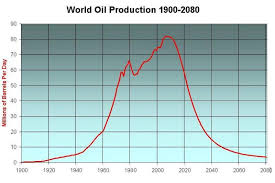
I've been reading Richard Heinberg's latest book, The End of Growth, which follows up where his book Peak Everything left off. Increasingly, it seems to me that we've turned a corner in our economic reality. Whereas before the arguments were monopolized, on the one hand, by the liberal Keynesians, who contended the path to growth, and thus full employment, was a robust participation by the federal government through spending to take up the slack in private demand; and on the other, by the Austrians and other "conservatives" who are convinced that government is the problem, and that big public debts are the precursors to runaway inflation, the "Deep Economics" of people like Heinberg (building on seminal work by Herman Daly and his Steady State Economics of the 1970's, along with all the brilliant books by Barry Commoner, which analyzed the thermodynamics of our energy predicament), Heinberg et al. proceed as if there is a physical environment involved in economic reality. Pretty wild, huh? I think so too.
I think that small lacuna, the absence of context, is what drives me a little nuts about liberal economists such as Paul Krugman. His personal style, grandiose as it is, grates somewhat, but it's his (apparently) unexamined belief that "growth in GDP," regardless of its composition, that makes me question whether there is really much of a difference between a "liberal" economist such as Krugman or Brad DeLong (on the faculty at John Yoo University) and a conservative. They all want the same thing, I guess: the return of the American consumer economy with unemployment at a nice, healthy 5%, growth at 4% of GDP, just like the good old days. They are only arguing about how to get there - should the federal government increase its existing deficit of around $1.5 trillion (and 43% of its total budget) to something along the lines of $2.5 trillion? Krugman & Co. say yes, because they're convinced the medium-term growth in the economy will allow the economy to fill in the difference with tax revenues in the longer term. The conservatives say this is folly, not because they don't believe in growth, but because the federal government will "crowd out" private investment or "over regulate."
Although I write about it from time to time, I don't really care whether the United States increases its budget deficits. The interest rates it pays on Treasury debt are, for the time being, dirt cheap, and the effect on servicing costs of the national debt (that $8 trillion or so that is truly "public," that is, not one of the intragovernmental trust funds or bonds owned by the Treasury's alter ego, the Federal Reserve) are not a big deal - now. But I actually don't care because it's pretty obvious we're never going to get near paying off the national debt anyway because that would require true growth in the economy, and that is not going to happen. So pile it on: a deadbeat with room on his credit limit may as well take things up to the max before he goes belly up.
What Heinberg & his ilk point out (Dmitry Orlov is very good on these same points) is that actual growth in an economy (as opposed to monetary and fiscal games, which the United States substitutes for productive activity) requires energy. We don't often think about the congruence of energy and economic growth because we've been distracted by people getting rich writing credit default swaps, which seem to require only household alternating current plugged into a computer. But at the macroeconomic level, an increase in wealth (meaning, an increase in the overall well-being of the general populace in terms of maintaining their vital heat through eating and shelter) requires a real interaction between the human race and the planet we live on. Fundamentally, this is because we are ourselves carbon-based life forms dependent on physical processes for survival; while it's confusing at times because of all the virtual avatars we now substitute for our actual selves, facebook and Twitter, by themselves, are not something you can eat. The way we effect the interaction between Homo sapiens and Earth is through the use of energy.
We are now entering an era of permanent shortage in the cheap liquid fuels on which modern civilization has been built, and everything is going to change as a result. In the United States, for example, liquid fuels (primarily gasoline) are used for 90% of the passenger miles traveled by Americans. Petroleum inputs are used in virtually everything, but most critically in order to carry on agribusiness. Our consumer society depends on long-range transportation of goods through the global economy to their Big Box destinations. At a point past Peak Oil (which has already happened), then the whole system begins to wobble, as the price of oil goes up, the fear of shortages begins to drive future prices, as the uncertainty of long-haul restocking begins to weigh on the decisions whether to expand existing business, et cetera. As Dmitry Orlov has demonstrated through a careful thought experiment, the ride down from Peak Oil is not a smooth descent, but a chaotic, bumpy ride, as various negative feedbacks begin to interact. More or less the way the world increasingly seems to be these days, in other words. We're just not always aware of the Man Behind the Curtain, imagining it's all because of one political "policy" decision or another. Things will become increasingly clear over the next decade, that's for sure.
As I say: an interesting read.


No comments:
Post a Comment